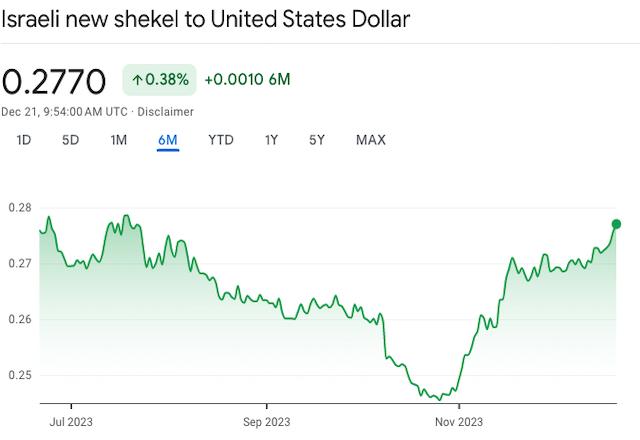The recent financial trends have highlighted a robust performance by the Israeli shekel, showing significant strength against major currencies like the US dollar and the euro. In recent inter-bank trading, the shekel-dollar exchange rate dropped by 1.07% to NIS 3.609/$, while the shekel-euro rate decreased by 1.04% to NIS 3.998/€. This marks the lowest levels for the dollar and euro against the shekel since July and June, respectively.
The Bank of Israel has played a pivotal role in this development. After setting the representative shekel-dollar rate at NIS 3.648/$ and the shekel-euro rate at NIS 3.990/€, the Bank announced a strategic plan to buy up to $30 billion in foreign currency at the onset of the war. This move, along with the actual purchase of $8.5 billion in foreign currency, predominantly in October, has been instrumental in stabilizing the shekel.
Don't bet against the Israeli Shekel pic.twitter.com/3As5NE2ICX
— 🇮🇱 JonoRose 🇮🇱 (@SirJonoRose) December 21, 2023
Remarkably, the shekel has recovered from its slump to NIS 4.08/$ in late October, influenced by the conflict with Hamas, and is now on a trajectory toward NIS 3.60/$. This recovery underscores the resilience of the Israeli economy and the effective financial strategies employed by the Bank of Israel.
Alim Remtulla, a foreign exchange strategist, predicts further strengthening of the shekel to NIS 3.55-3.60/$ in the first quarter of 2024. This positive outlook is expected to rejuvenate investor interest in the Tel Aviv Stock Exchange.
The war's impact on the Israeli economy has been significant, leading to the issuance of over five billion dollars in bonds in recent weeks. These efforts aim to stabilize the economy and support the war effort, although they come at a higher yield due to increased investor perception of risk.
Israel's proactive and swift response in managing its currency is reflective of a global trend where central banks have become more assertive. The Bank of Israel's commitment of a substantial reserve during the crisis is a testament to its ability to navigate economic challenges effectively. This approach mirrors actions taken by central banks worldwide in response to various economic crises, demonstrating the evolving role and agility of these institutions in modern financial systems.
World News: Israeli Shekel Regains Value Lost Against Dollar After Attackshttps://t.co/rkCvSXpJKthttps://t.co/R78qCyp5tr#news #gbn24 #news24 #news_today #breaking_news #world #business #sport #entertainment #tech pic.twitter.com/yyWtS6nAwG
— GBN24 (@GBN24_online) December 20, 2023
Inflation in Israel has moderated to 3.3%, leading analysts to anticipate a potential interest rate cut by the Bank of Israel. This is in parallel with expectations of similar moves by the US Federal Reserve in early 2024.
Overall, the Israeli shekel's current strength is a sign of the country's economic resilience and the effective monetary policies of the Bank of Israel. It reflects a broader global pattern of responsive and adaptive central banking in the face of economic challenges.


